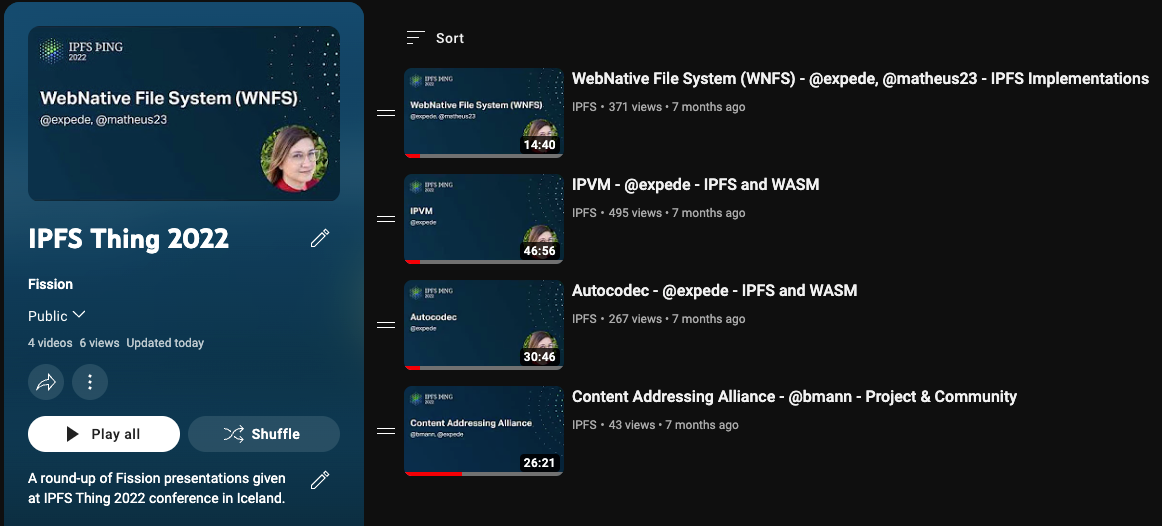Fission can't wait to return to IPFS Thing. We're presenting nine talks and will share progress on some of our most anticipated projects, including IPVM, RhizomeDB, and a Passkeys + UCAN integration.
What is IPFS Thing?
IPFS Thing is a week-long gathering for the IPFS implementors community featuring talks, workshops, discussion circles, hacking time, and more.
Last year the conference was held in Reykjavik, Iceland. Here's a quick recap:
Fission attended in 2022 and gave four talks about our work in the IPFS ecosystem. You can watch a playlist of those talks here (click the image to navigate to the playlist):

Fission Talks at IPFS Thing 2023
This year IPFS Thing will be held in Brussels, Belgium, April 15-19, and Fission is thrilled to return for another year. We look forward to connecting and collaborating with many innovators in the space and are incredibly honored to be giving nine(!) talks throughout the week.
Here are the talk abstracts:
Interplanetary Databases Track
Querying Decentralized Data in Rhizomatic Systems with Quinn Wilton
Shifting storage and compute toward the far edge reflects an extreme departure from traditional cloud-based architectures, bringing with that shift a new set of challenges for application developers. Rhizome is a decentralized database for InterPlanetary Linked Data that embraces these challenges to open up new ways of thinking about consistency, interoperability, and privacy. This talk introduces the ideas underpinning Rhizome, and demonstrates how they come together to empower developers to build and reason about new types of peer-to-peer and decentralized applications.
Data Transfer Track
CAR Mirror Reflections with James Walker
CAR Mirror describes a method for efficiently diffing, deduplicating, packaging, and transmitting IPLD data from source to sink. In this talk, there will be an introduction to the CAR Mirror protocol followed by a review of the current state of the Go implementation.
Data Transfer Batching Techniques Featuring Blake3, CAR Mirror, and More with Phillip Krüger
Batching block transfer is the main way to optimize DAG exchange compared to bitswap. This talk discusses current proposals for batched data transfer, such as blake3 with bao, sending CAR files, CAR mirror, and GraphSync. We’ll look at what use cases they do and don’t solve and which techniques from one protocol could be applied in others.
IPFS On The Web Track
The Name Name Service – Discoverable, Verifiable Names for Decentralized Infrastructures with Blaine Cook
NNS is a new approach to providing distributed discovery for human-readable names. NNS builds upon DIDs and UCANs to allow permissionless delegation and service discovery, emphasizing improving end-user UX for IPFS and related services. This talk will overview the approach, discuss use cases, and explore anticipated challenges.
WNFS: Versioned and Encrypted Data on IPFS with Phillip Krüger
The WebNative File System (WNFS) empowers users with extensible metadata, file and directory history, conflict resolution, and encryption with fine-grained access levels. We show a rough outline of its design goals, how it works, our roadmap, and possibly a demo of our new Rust implementation.
Integrating IPFS Track
Decentralizing Auth, and UCAN Too with Brooklyn Zelenka
UCAN is a decentralized auth format used by several DWeb, web3, and IPFS projects. Much like how IPFS uses content addressing to liberate data from centralized hosts, UCAN uses CIDs and OCAP to liberate apps from centralized auth servers. Learn how UCAN can help throughout the IPFS stack, from block-level access to user permissions to application interop.
Community & Governance Track
Starmaps: A Cross-Team Roadmapping Tool with Bastien Dehaynin
I would like to share Starmaps, a tool Protocol Labs developed for roadmapping based on Github issues. It is especially good for rendering cross-teams/projects roadmaps, which is perfect for improving visibility inside the network and communicating dependencies more easily. We have started using it at Fission, and our goal is to have as many PLN projects as possible rendered in a single Starmap where you can navigate and look at the dependencies between projects.
Decentralized Compute & AI Track
IPVM: Content Addressed Compute for an Open World with Brooklyn Zelenka
Curious about the latest from the IPVM WG? This talk presents updates from the working group: a high-level overview of IPVM, standards to date, the latest roadmap, and lessons learned so far. This includes invocation and workflow models, a (pluggable) effect system, a principled approach to partial failure, open interop, kernel functionality, private data handling, and the most common question: what IPVM is *not*!
Foundations for Open-World Compute: Homestar, an IPVM Tale with Zeeshan Lakhani
At Fission, we've been laying down the groundwork for an IPVM implementation called Homestar, a distributed compute engine built with IPFS and IPLD at its core, along with first-class support for the Wasm (WebAssembly) Component Model and Interface Types, a vision for managed effects, and primitives for open-world replayability, capability discovery (UCAN capabilities specifically), and execution coordination. In this talk, we'll predominantly focus on the deterministic Wasm subset of the engine, particularly on why we've sided with the Wasm Component model, how we bidirectionally translate between IPLD and Wasm Interface Types at runtime and aim to achieve a legitimate write once, run anywhere ethos. We'll also dive into approaches related to the monumental challenge involving open-world interoperability, especially in the context of other distributed workflow frameworks and toward the goal of fault-oblivious computing.
UCANs + Passkeys

In addition to these exciting talks, our newest Fissioneer, Hugo Dias, will offer demos of a prototype he built that uses a combination of Passkeys and UCANs to authenticate users signing into Webnative apps.
As you know, we at Fission love passwordless authentication. Passkeys are a fantastic opportunity to onboard more users into apps without them needing to create a password, Ethereum wallet, or use a browser extension. Currently, Passkeys work best for Web2 use cases because they need to connect a server and the user's device for validation purposes. However, we want a local-first solution - one that is native to the browser.
That's where UCANs come in! UCANs can act as a source of truth for authorization, where servers would typically come into play. To utilize UCANs and have decentralized auth, you need a DID and a private key. Passkeys can use face scanning, fingerprint touch, or hardware authenticators to seed DIDs and cryptographic signatures. This is what we're working on implementing at Fission.
If you want to see Hugo's demo, find him at IPFS Thing!
Stay Informed
In-person tickets are still available for IPFS Thing 2023, but if you can't make it to Brussels, don't worry! All talks will be recorded, and we will be sure to share them on the blog (with a deeper dive into each talk) when available.
On that note, be sure to subscribe to our newsletter so you can receive our blog posts and Fission news directly in your inbox.
